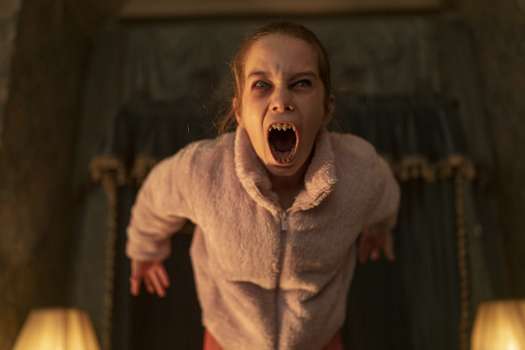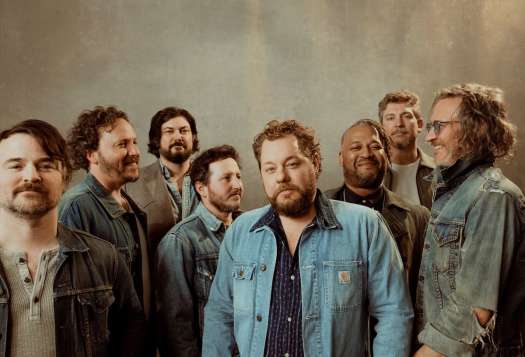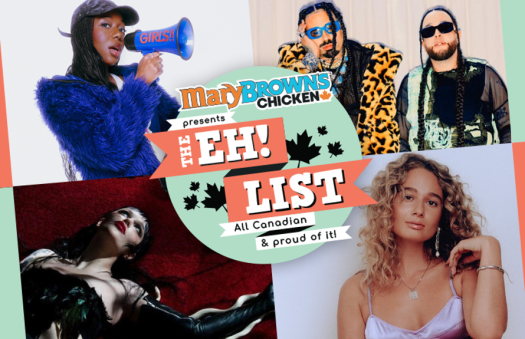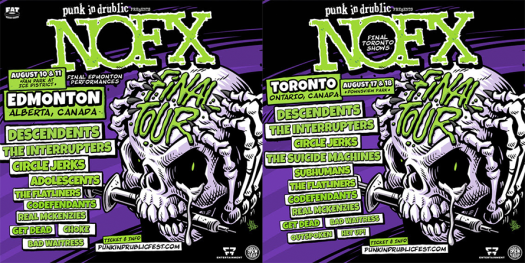Few bands embody melodic '90s punk like Face to Face. Their buzz-saw guitars, socially conscious lyrics and sing-along choruses hearken back to '80s heroes Bad Religion and the Descendents. But the group married their influences with an innate tunefulness that helped land them a brief stint on A&M and widespread exposure via the rock radio hit "Disconnected." They called it quits back in 2004, but started playing reunion shows four years later. Now, they've just released Laugh Now, Laugh Later, their first new record in nine years. "Once we had a little bit of time away from it, it made us appreciate it one hundred times more," says singer-guitarist Trever Keith. The quartet will hit the road hard over the next 12 months with gigs in the works for Europe, Australia and South America as Face to Face prove that they're as relevant now as they were 15 years ago.
When Face to Face got back together in 2008, was the intention to do a full-blown reunion? You seemed to book a lot of small tours at first.
It's completely happened incrementally. At first we were just going to do a dozen shows a year, then we got the Warped Tour, then we decided to do another record and we've really been really active since we reformed. It's basically been just the interest from the fans and availability. We have a strong work ethic so we're hitting it full boar.
The band has been playing reunion gigs for a while now. What led you to wanting to go back in the studio?
A little bit of a creative need to go back in and record some of these new ideas we've been coming up with. But also a little bit out of necessity. When we reformed, we didn't want to just limit ourselves to becoming just a revival act. We do play mostly old material in the set, but we wanted to put ourselves on a forward arc. So we could continue to be relevant and make new music and all that kind of good stuff. It was kind of the natural progression.
Was there any fear that fans didn't want to hear new stuff?
No, not really. We're pretty sensitive to what our fan base wants, or doesn't want. We don't operate from an angle of trying to please them always, but they're the reason we exist largely. You always run the risk of fans not liking the new record, but we try to slowly integrate new material into the set. We don't really beat people over the head with it. We do maybe two or three songs a night and we'll see how the fans start reacting to the record once its released. If we feel that we can get some more in there and everyone's still having a good time and enjoying themselves, we'll sneak more in.
The record was supposed to come out in January. What was the hold up?
It kind of took a bit of time to put together because we recorded in steps. We recorded the record right before we went on the Warped Tour last summer and we looked for a mixer for quite a while until we were able to have the time to come up with the guy we wanted. We were lucky enough to have Joe Barresi. It was worth the wait. He did a great job. We figured out some distribution and label partners. It took a bit of extra time but we finally got it all pulled together after four or five months of wrangling.
And it's coming out on your label, Antagonist?
It is on Antagonist through People Like You/Century Media. They're our marketing partner and distribution company.
Who did the album art? It looks very intricate.
We had the good fortune of collaborating with [LA Ink tattoo artist] Cory Miller, who has become a really good friend of the band. He created a lot of really amazing original artwork for the album. So it will be showcased on both the vinyl and CD version of the record. More on the vinyl actually. And we're just stoked to work with Cory. It really ties his art and our art, the music and visual thing, together. It's a really strong package for this record.
What's the songwriting dynamic these days?
We've never been a band that writes in the studio. Typically, I'd bring basic songs ideas into the rehearsal space and we'd work on them until we'd hammer them into shape. This time I'd worked out half-a-dozen songs on my own and Scott [Shiflett, bassist] wrote a half dozen songs on his own and we demoed them up. After we had that figured out, we got together and worked on those songs and collaborated. We wrote two or three songs together, including "Should Anything Go Wrong," which ended up being one of the strongest songs on the record.
And everything ran smoothly? There was no old animosity that reared its head in the studio?
You know, of the line-up that we currently have, which is mostly the original dudes ― it's me and Chad [Yaro, guitarist] and Scott. Scott being in the band since '95, he's the newest member. He's been in the band longer than our original bassist, playing songs that our original bassist wrote. We consider it three-quarters of the original line-up. We've never really had any personality conflicts. The band didn't break up because we didn't get along; we broke up because we wanted to focus on projects outside of Face to Face. And we felt we wouldn't be allowed to do it without breaking the band up. We didn't want to live in the shadow of that. But after we'd been away from it for four or five years, we quit looking at Face to Face as a burden and started looking at it as something precious, that few people manage to put together in bands. It's just such an awesome shared experience between our fans and us. It's something that couldn't be denied any longer and we just really wanted to get back to that. It couldn't be recreated through any of our other projects or anything else we were trying to do. Once we had a little bit of time away from it it made us appreciate it one hundred times more.
Are you surprised at how enduring the band has been?
I don't really think about it that way. My brain is more focused on trying to do it. How I can make it work best, how I can promote records best and make tours happen. I don't really feel I've had the time to sort of sit back and go "wow, I can't believe we've managed to make this go for so long." I'm more focused on making it continue to go.
Was that the impetus behind getting "Disconnected" into Guitar Hero?
Well that happened during our break-up. But yeah, I always want to take advantage of those new opportunities whether we're promoting a new record or inactive.
You released a best of, Shoot to the Moon, in 2005 through Antagonist. Does that mean you have control over your back catalogue?
We've had control over the material on every record we've released. We've never limited ourselves by getting into some crappy record deal where we couldn't make the music we wanted. Most of our frustration with labels over the years has been how they promoted or marketed our albums after we'd completed them. But it was complete freedom. We didn't have anyone at all paying attention while we made the new record because we funded it out of our own pocket. We had no one to answer to which was really cool. But we've always enjoyed a pretty healthy level of freedom on all our records.
Are there any intentions to re-issue the old records?
Yeah actually. Part of the deal that I did with PLY/Century Media was that they will be re-releasing our catalogue. I re-released the Face to Face catalogue digitally seven or eight years ago, but none of those labels have been making physical copies of that music for quite sometime. So I'm looking to getting at least CDs back out there, but I'm more excited about getting limited edition and collectable vinyl versions of the back catalogue out there with bonus tracks and additional artwork and all that good stuff. So we're going to spend the next couple of years rolling those out slowly here and there.
Looking back, are there any records that you're not terribly happy about? I read that you don't play anything from Ignorance is Bliss live.
Ignorance is Bliss is probably my most proud accomplishment in our catalogue just as a recording. The production on it is awesome, I think it still sounds great, the performances are great. I think that record has held up extremely well. What I have been upset about is that I don't think that Big Choice sounds that great. I like the songs on it, but I think we could have done a better job at getting a better sounding record made. A lot of that has to do with the inexperience of youth, and just being pushed around a bit by our label and what not at the time. Being forced into situations we weren't entirely comfortable with. But it never affected the actual songs. It's really just the production. A re-released Big Choice would probably be a remixed one, and at the very least remastered so it gets a little fatter and warmer sounding.
Do any of the band members' other projects have things in the works?
Not currently. The stuff that both Scott and I focused on during the break-up will most certainly be ongoing and things that we'd like to continue to do. I'm planning on doing another solo record at some point but it's not high on my priority list right now. Everyone in the band is really focused on Face to Face right now. That's not to say that some of those other projects might not pop up in the near future, but right now we're just really gung-ho on the new face to face record and touring for that.
Anything else Face to Face has coming doing the pike?
I just released a split seven-inch that's Face to Face and Rise Against. They cover one of our songs and we cover one of theirs. Yeah, it's a limited edition vinyl seven-inch. We've already pre-sold 750 but you'll be able to find them in record stores. We haven't really done a lot of recording other than that. We're just really now focused on our live shows. We're going to be busy. I wouldn't rule out another North American tour in early to mid-2012 for the same record.
When Face to Face got back together in 2008, was the intention to do a full-blown reunion? You seemed to book a lot of small tours at first.
It's completely happened incrementally. At first we were just going to do a dozen shows a year, then we got the Warped Tour, then we decided to do another record and we've really been really active since we reformed. It's basically been just the interest from the fans and availability. We have a strong work ethic so we're hitting it full boar.
The band has been playing reunion gigs for a while now. What led you to wanting to go back in the studio?
A little bit of a creative need to go back in and record some of these new ideas we've been coming up with. But also a little bit out of necessity. When we reformed, we didn't want to just limit ourselves to becoming just a revival act. We do play mostly old material in the set, but we wanted to put ourselves on a forward arc. So we could continue to be relevant and make new music and all that kind of good stuff. It was kind of the natural progression.
Was there any fear that fans didn't want to hear new stuff?
No, not really. We're pretty sensitive to what our fan base wants, or doesn't want. We don't operate from an angle of trying to please them always, but they're the reason we exist largely. You always run the risk of fans not liking the new record, but we try to slowly integrate new material into the set. We don't really beat people over the head with it. We do maybe two or three songs a night and we'll see how the fans start reacting to the record once its released. If we feel that we can get some more in there and everyone's still having a good time and enjoying themselves, we'll sneak more in.
The record was supposed to come out in January. What was the hold up?
It kind of took a bit of time to put together because we recorded in steps. We recorded the record right before we went on the Warped Tour last summer and we looked for a mixer for quite a while until we were able to have the time to come up with the guy we wanted. We were lucky enough to have Joe Barresi. It was worth the wait. He did a great job. We figured out some distribution and label partners. It took a bit of extra time but we finally got it all pulled together after four or five months of wrangling.
And it's coming out on your label, Antagonist?
It is on Antagonist through People Like You/Century Media. They're our marketing partner and distribution company.
Who did the album art? It looks very intricate.
We had the good fortune of collaborating with [LA Ink tattoo artist] Cory Miller, who has become a really good friend of the band. He created a lot of really amazing original artwork for the album. So it will be showcased on both the vinyl and CD version of the record. More on the vinyl actually. And we're just stoked to work with Cory. It really ties his art and our art, the music and visual thing, together. It's a really strong package for this record.
What's the songwriting dynamic these days?
We've never been a band that writes in the studio. Typically, I'd bring basic songs ideas into the rehearsal space and we'd work on them until we'd hammer them into shape. This time I'd worked out half-a-dozen songs on my own and Scott [Shiflett, bassist] wrote a half dozen songs on his own and we demoed them up. After we had that figured out, we got together and worked on those songs and collaborated. We wrote two or three songs together, including "Should Anything Go Wrong," which ended up being one of the strongest songs on the record.
And everything ran smoothly? There was no old animosity that reared its head in the studio?
You know, of the line-up that we currently have, which is mostly the original dudes ― it's me and Chad [Yaro, guitarist] and Scott. Scott being in the band since '95, he's the newest member. He's been in the band longer than our original bassist, playing songs that our original bassist wrote. We consider it three-quarters of the original line-up. We've never really had any personality conflicts. The band didn't break up because we didn't get along; we broke up because we wanted to focus on projects outside of Face to Face. And we felt we wouldn't be allowed to do it without breaking the band up. We didn't want to live in the shadow of that. But after we'd been away from it for four or five years, we quit looking at Face to Face as a burden and started looking at it as something precious, that few people manage to put together in bands. It's just such an awesome shared experience between our fans and us. It's something that couldn't be denied any longer and we just really wanted to get back to that. It couldn't be recreated through any of our other projects or anything else we were trying to do. Once we had a little bit of time away from it it made us appreciate it one hundred times more.
Are you surprised at how enduring the band has been?
I don't really think about it that way. My brain is more focused on trying to do it. How I can make it work best, how I can promote records best and make tours happen. I don't really feel I've had the time to sort of sit back and go "wow, I can't believe we've managed to make this go for so long." I'm more focused on making it continue to go.
Was that the impetus behind getting "Disconnected" into Guitar Hero?
Well that happened during our break-up. But yeah, I always want to take advantage of those new opportunities whether we're promoting a new record or inactive.
You released a best of, Shoot to the Moon, in 2005 through Antagonist. Does that mean you have control over your back catalogue?
We've had control over the material on every record we've released. We've never limited ourselves by getting into some crappy record deal where we couldn't make the music we wanted. Most of our frustration with labels over the years has been how they promoted or marketed our albums after we'd completed them. But it was complete freedom. We didn't have anyone at all paying attention while we made the new record because we funded it out of our own pocket. We had no one to answer to which was really cool. But we've always enjoyed a pretty healthy level of freedom on all our records.
Are there any intentions to re-issue the old records?
Yeah actually. Part of the deal that I did with PLY/Century Media was that they will be re-releasing our catalogue. I re-released the Face to Face catalogue digitally seven or eight years ago, but none of those labels have been making physical copies of that music for quite sometime. So I'm looking to getting at least CDs back out there, but I'm more excited about getting limited edition and collectable vinyl versions of the back catalogue out there with bonus tracks and additional artwork and all that good stuff. So we're going to spend the next couple of years rolling those out slowly here and there.
Looking back, are there any records that you're not terribly happy about? I read that you don't play anything from Ignorance is Bliss live.
Ignorance is Bliss is probably my most proud accomplishment in our catalogue just as a recording. The production on it is awesome, I think it still sounds great, the performances are great. I think that record has held up extremely well. What I have been upset about is that I don't think that Big Choice sounds that great. I like the songs on it, but I think we could have done a better job at getting a better sounding record made. A lot of that has to do with the inexperience of youth, and just being pushed around a bit by our label and what not at the time. Being forced into situations we weren't entirely comfortable with. But it never affected the actual songs. It's really just the production. A re-released Big Choice would probably be a remixed one, and at the very least remastered so it gets a little fatter and warmer sounding.
Do any of the band members' other projects have things in the works?
Not currently. The stuff that both Scott and I focused on during the break-up will most certainly be ongoing and things that we'd like to continue to do. I'm planning on doing another solo record at some point but it's not high on my priority list right now. Everyone in the band is really focused on Face to Face right now. That's not to say that some of those other projects might not pop up in the near future, but right now we're just really gung-ho on the new face to face record and touring for that.
Anything else Face to Face has coming doing the pike?
I just released a split seven-inch that's Face to Face and Rise Against. They cover one of our songs and we cover one of theirs. Yeah, it's a limited edition vinyl seven-inch. We've already pre-sold 750 but you'll be able to find them in record stores. We haven't really done a lot of recording other than that. We're just really now focused on our live shows. We're going to be busy. I wouldn't rule out another North American tour in early to mid-2012 for the same record.




